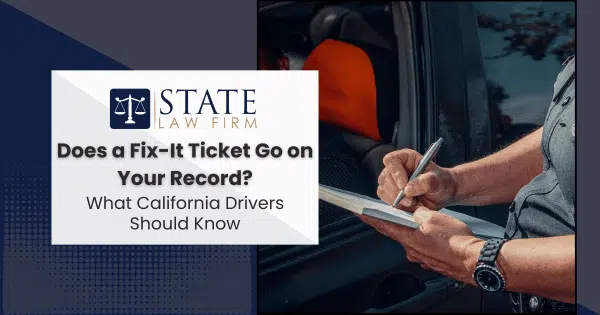In California, a “fix-it” ticket is the state’s way of nudging drivers to correct minor issues like a broken taillight or expired registration without hammering them with long-term penalties.
But does one of these tickets end up on your driving record or affect your insurance?
Here is what to expect, what to do next, and how to keep your record clean.
Understanding Fix-It Tickets: What Are They and Why Are They Issued?
A fix-it ticket is officially a “correctable violation.” It covers equipment, license, registration, and insurance issues that can be cured by fixing the problem and showing proof to the court. California’s Vehicle Code authorizes officers to issue a notice to correct and identifies which violations are eligible for correction.
Courts and county agencies across California explain the same core idea: fix the defect and submit proof of correction, usually with a small administrative fee per violation.
Key takeaway: A fix-it ticket is designed for compliance, not punishment. If you correct the issue by the deadline and follow the court’s instructions, the charge is typically dismissed.
What to do immediately
- Read your citation and look for the “Correctable Violation (Veh. Code § 40610)” checkbox or similar language. If checked, your violation is likely eligible.
- Fix the problem right away. Then have a law enforcement officer or authorized station sign the certificate of correction on the ticket or notice. Registration or license issues can often be verified by the DMV or court clerk.
- Submit proof and pay the administrative fee by your due date.
The Process of Receiving a Fix-It Ticket in California
- Citation issued: An officer may issue a notice to correct for eligible equipment, license, or registration problems. In some situations, an officer can instead require a standard “notice to appear,” but most minor correctable issues qualify for notice to correct.
- Correct and certify: Repair the defect, update your documents, or obtain insurance as applicable. Then, get the corrections’ approval from the appropriate authority, as noted on your ticket or court website.
- File proof and pay the fee: Courts collect a $25 transaction fee for each corrected violation under Vehicle Code § 40611. Local court pages echo this exact requirement and outline how to file proof.
- Dismissal: When you submit proof of correction and the fee promptly, courts typically dismiss the correctable count. Some offenses are not eligible if there is fraud, persistent neglect, or an immediate safety hazard.
Pro tip: Keep copies of everything you submit. If you mail proof, use a trackable method. Many courts let you submit proof online or by mail. Always meet the date on your ticket or the reminder notice.
Do Fix-It Tickets Impact Your Driving Record or Insurance?
If you correct the issue and the court dismisses the violation, it does not add DMV points because there is no conviction. DMV points are assigned to traffic convictions that involve the safe operation of a motor vehicle. A dismissed correctable violation does not result in a sentence or points.
By contrast, the California DMV point system assigns one or two points for specified moving violations and at-fault collisions, but nonmoving correctable issues are not on that list.
Insurance impact: Insurers typically consider convictions and reportable events. When a fix-it ticket is dismissed after proof of correction, there is no conviction to report. Problems can arise if you ignore the ticket. Failing to correct can lead to a sentence, additional fines, a failure-to-appear hold, or related consequences that can ultimately show up and affect insurance.
Bottom line: Take care of corrections and filings on time. If you do, a fix-it ticket should not end up on your record or raise your rates.
If a crash is involved: Separate from a fix-it ticket, a collision that you are deemed responsible for can add a point and affect your record and insurance. That is independent of any correctable equipment or documentation issue.
Talk to our San Mateo auto accident attorneys if you’ve been involved in a crash on the Peninsula.
Steps to Take After Receiving a Fix-It Ticket
- Confirm eligibility: Look for correctable-violation language or the § 40610 checkbox on the citation or in your court reminder. If you are unsure, check your local court’s traffic page.
- Fix the issue fast: Replace bulbs, repair windshield cracks, renew registration, obtain insurance, or address license issues. Then get the ticket signed off by an officer or the proper certifying agency.
- Submit proof and pay $25 per violation: Vehicle Code § 40611 authorizes a $25 transaction fee for each corrected count. Courts provide detailed instructions on how to pay and file proof by mail, online, or in person.
- Track your deadline: The ticket or courtesy notice lists your due date. Late submissions can convert your situation into a conviction, trigger civil assessments, or generate a DMV hold.
- Keep documentation: Save copies of the signed citation, receipts, and any photos of the corrected item, in case a clerical mismatch occurs.
Pro tip: For mechanical issues, some counties require a certificate from a licensed light and brake station or a smog station for specific defects. Check your court’s instructions before you line up at an agency or station.
The Differences Between Fix-It Tickets and Other Traffic Violations
- Disposition: Fix-it tickets are dismissed upon timely proof of correction and fee. Moving violations typically lead to a conviction unless dismissed or masked by traffic school.
- Points: Dismissed correctable violations add no points. Moving violations can add one or two points under the Vehicle Code and may trigger DMV negligent operator actions if points accumulate.
- Costs: Correctable violations have a defined $25 court fee per count. Moving violations carry bail amounts, penalty assessments, and frequently higher total costs.
- Insurance: A dismissed fix-it ticket does not usually affect insurance. Moving violation convictions are typically reportable and can raise premiums.
Pro tip: If your citation includes both a correctable issue and a moving violation, handle the correction right away. For the moving violation, evaluate eligibility for traffic school per your local court rules to keep points off your public record where possible.
Key Takeaways for California Drivers Regarding Fix-It Tickets and Their Records
Fix-it tickets exist to encourage compliance. If you correct the problem, get the proper sign-off, and pay the $25 fee per violation by the deadline, the court will usually dismiss the charge and it will not add points to your DMV record. Ignore it and you risk fines, holds, and potential insurance consequences. When in doubt, follow your court’s instructions and resolve the issue quickly.


